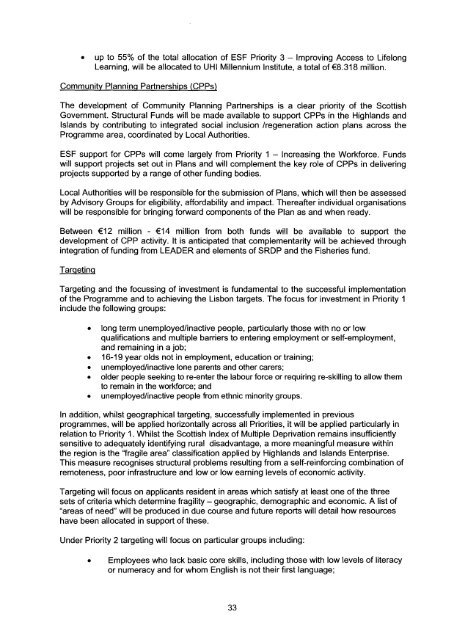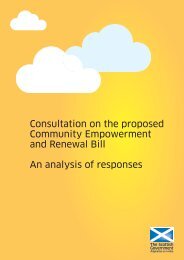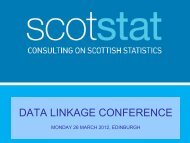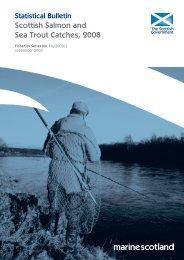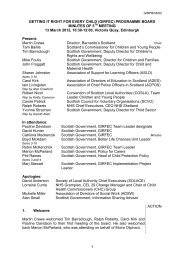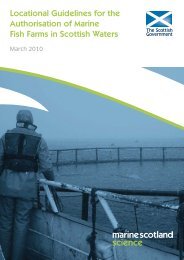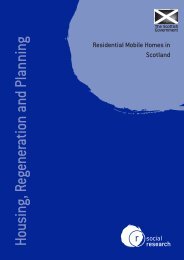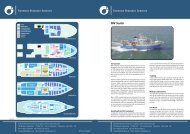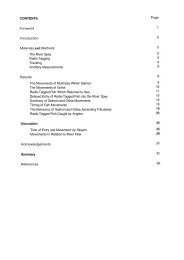Open - Scottish Government
Open - Scottish Government
Open - Scottish Government
Create successful ePaper yourself
Turn your PDF publications into a flip-book with our unique Google optimized e-Paper software.
• up to 55% of the total allocation of ESF Priority 3 - Improving Access to Lifelong<br />
Learning, will be allocated to UHI Millennium Institute, a total of€8.318 million.<br />
Community Planninq Partnerships (CPPs)<br />
The development of Community Planning Partnerships is a clear priority of the <strong>Scottish</strong><br />
<strong>Government</strong>. Structural Funds will be made available to support CPPs in the Highlands and<br />
Islands by contributing to integrated social inclusion Iregeneration action plans across the<br />
Programme area, coordinated by Local Authorities.<br />
ESF support for CPPs will come largely from Priority 1 - Increasing the Workforce. Funds<br />
will support projects set out in Plans and will complement the key role of CPPs in delivering<br />
projects supported by a range of other funding bodies.<br />
Local Authorities will be responsible for the submission of Plans, which will then be assessed<br />
by Advisory Groups for eligibility, affordability and impact. Thereafter individual organisations<br />
will be responsible for bringing forward components of the Plan as and when ready.<br />
Between €12 million - €14 million from both funds will be available to support the<br />
development of CPP activity. It is anticipated that complementarity will be achieved through<br />
integration of funding from LEADER and elements of SRDP and the Fisheries fund.<br />
Taroetinq<br />
Targeting and the focussing of investment is fundamental to the successful implementation<br />
of the Programme and to achieving the Lisbon targets. The focus for investment in Priority 1<br />
include the following groups:<br />
• long term unemployedlinactive people, particularly those with no or low<br />
qualifications and multiple barriers to entering employment or self-employment,<br />
and remaining in a job;<br />
• 16-19 year olds not in employment, education or training;<br />
• unemployed/inactive lone parents and other carers;<br />
• older people seeking to re-enter the labour force or requiring re-skilling to allow them<br />
to remain in the workforce; and<br />
• unemployed/inactive people from ethnic minority groups.<br />
In addition, whilst geographical targeting, successfully implemented in previous<br />
programmes, will be applied horizontally across all Priorities, it will be applied particularly in<br />
relation to Priority 1. Whilst the <strong>Scottish</strong> Index of Multiple Deprivation remains insufficiently<br />
sensitive to adequately identifying rural disadvantage, a more meaningful measure within<br />
the region is the "fragile area" classification applied by Highlands and Islands Enterprise.<br />
This measure recognises structural problems resulting from a self-reinforcing combination of<br />
remoteness, poor infrastructure and low or low earning levels of economic activity.<br />
Targeting will focus on applicants resident in areas which satisfy at least one of the three<br />
sets of criteria which determine fragility - geographic, demographic and economic. A list of<br />
"areas of need" will be produced in due course and future reports will detail how resources<br />
have been allocated in support of these.<br />
Under Priority 2 targeting will focus on particular groups including:<br />
• Employees who lack basic core skills, including those with low levels of literacy<br />
or numeracy and for whom English is not their first language;<br />
33


